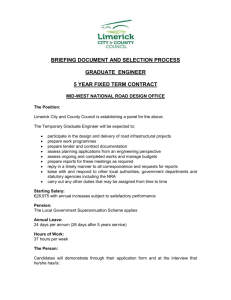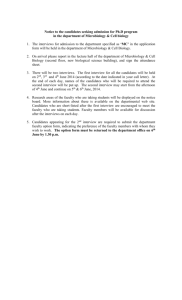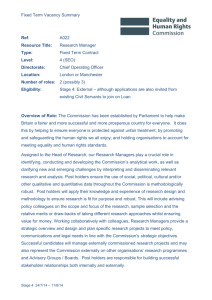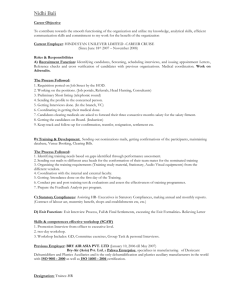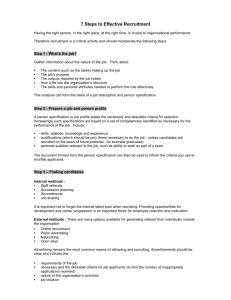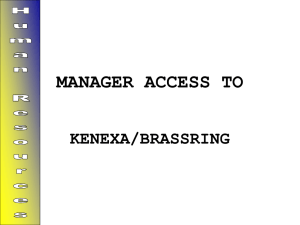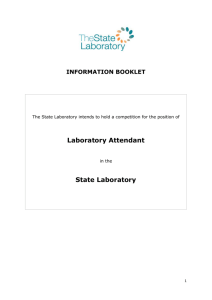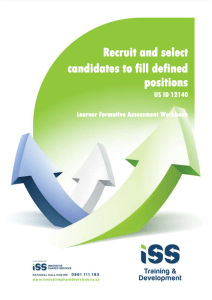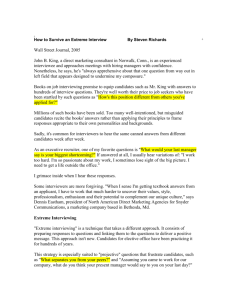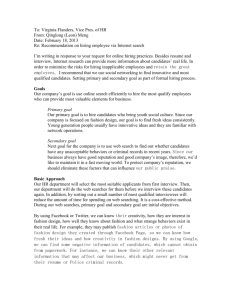Employment: Recruitment, Retention, and Meeting Management
advertisement
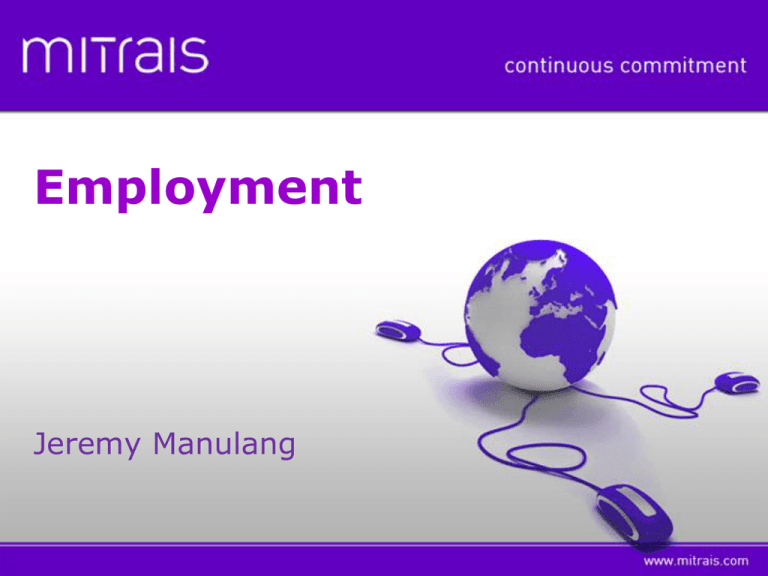
Employment Jeremy Manulang Employment Overview Vocabulary: The recruitment process Reading : Retaining good staff Listening : Headhunting Language Review : Indirect questions and statements Skills : Managing Meetings Case study : Slim Gyms No matter how successful you are, your business and its future are in the hands of the people you hire. Aiko Morita Starting UP! In your opinion, which factors are important from getting a job? Is there anything missing from the list? Appearance Intelligence References Blood group Contacts Hobbies Marital Stat Age Sickness Family Experience Personality Astrology sign Qualification Handwriting Tell your peers about…… Think about the jobs you’ve had and interviews you’ve attended. Ask each other about your best or worst: a. Job b. Interview c. Boss d. Colleagues e. SALARY : No you can’t! Discuss these statements.. 1. At work appearance is more important than performance 2. You should keep your private life totally separate from your work. 3. People don’t change much during their working lives. 4. It is the best to work for as few companies as possible. 5. Everybody should retire at 50. Vocabulary Match the verb 1 to 6 to the noun a to f to make the word partnership. 1. To 2. To 3. To 4. To 5. To 6. To train shortlist advertise assemble make check a. a vacancy/post b. interview panel c. the candidates d. references e. new staff f. a job offer Listening • Listen to a consultant talking about the recruitment process to check your answer. PUT THESE SENTENCES IN THE RIGHT ORDER THE RECRUITMENT PROCESS • a. To train new staff • b. To advertise a vacancy / post • c. To shortlist the candidates • d. To assemble an interview panel • e. To make a job offer • f. To check references Answers: b-c-d-f-e-a Complete the text • These days many applicants submit their ………….................... (1) speculatively to companies they would like to work for. In other words, they do not apply for an advertised job but hope the employer will be interested enough to keep their CV on file and contact them when they have a vacancy. When replying to an advertisement, candidates often fill in a / an ………………………(2) and write a / an ………………..(3). The employer will then invite the best candidates to attend a / an …………….. (4). Sometimes candidates will take a / an ……………………test (5) before the interview to assess their mental ability and reasoning skills. These days it is normal for successful candidates to have to work a / an ……………….(6) in a company. This is usually three or six months; after that they are offered a permanent post. (resume/CV, interview, psychometric test, probationary period, application form, cover letter) Discuss and Compare! Which of these words would you use to describe yourself in a work situation? Motivated Dedicated Charismatic Impulsive Assertive Persuasive Outspoken Trustworthy quick-witted Confident Determined adaptable meticulous law-abiding enthusiastic intuitive passionate straightforward Reliable proud loyal honest decisive shy corrupt flexible dynamic informal selfish forceful ambitious competitive tactful Reading RETAINING GOOD STAFF P.70 Answer these questions: 1. What qualities of high performers are mentioned in the article? 2. What are the problems of losing high performers? 3. Which motivating factors are mentioned in the article? Use these words or phrases from the article to answer the questions. Pep talk mentor CV Headhunting Financial package Fast-tracking Which word or phrase: 1. Is British English for the American English resume? 2. Refers to stealing employees from companies? 3. Do you often find in job advertisement referring to money and benefits? 4. Refers to an older, more experienced person who helps you? 5. Usually leads to quick promotion? 6. Means a short chat to motivate staff? Listening 8.2 Dr Simon Kingston works for the International executive search consultants Heidrick and Struggles. Listen to the first part of the interview and complete the chart. Methods for identifying candidates … (1) in newspaper or… (2) Asking for… (3) from the organization From our … (5) Own original … (4) From talking to… (6) Cross - … (9) From beginning to … (7) the business … (8) • Listen to the second part of the interview, and complete the summary.
